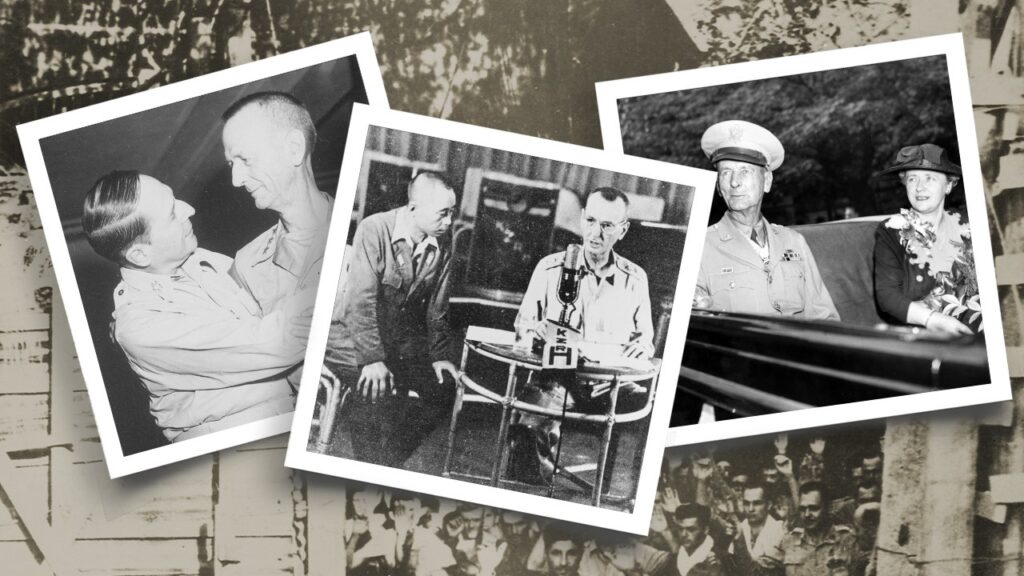On April 9, the United States commemorates National Former Prisoner of War Recognition Day, a significant occasion to honor the sacrifices made by those who endured the horrors of captivity. In alignment with this observance, Fox News anchor Dana Perino engaged in a profound discussion with Jonathan Horn, a former White House speechwriter and historian, about his compelling book titled “The Fate of the Generals”. This literary piece sheds light on the remarkable journey of General Jonathan Wainwright, who became the highest-ranking American prisoner of war (POW) during World War II. The conversation not only highlighted Wainwright’s legacy but also underscored the broader implications of his story within the context of American military history.
During the interview, Perino initiated the discussion by inquiring about the identity of General Wainwright. Horn elaborated that Wainwright was a determined and gritty cavalryman hailing from Montana, near the historical site of the Little Bighorn battlefield. This connection to American military history set the tone for Wainwright’s own journey, which took a pivotal turn during World War II. His career trajectories intersected dramatically when the Japanese forces invaded the Philippines shortly after the attack on Pearl Harbor. Wainwright’s ascension to becoming the top United States commander in the Philippines came when his superior, General Douglas MacArthur, received orders to evacuate. Rather than fleeing, Wainwright made a solemn oath to stay and share the grim fate of his soldiers, which ultimately left him as the highest-ranking American military prisoner of the Japanese.
Perino’s next question addressed the significance of April 9 in the American historical calendar. Horn explained that this date marks the anniversary of the largest surrender of U.S. forces, occurring in 1942 when American and Filipino troops retreated into the Bataan peninsula. Here, they faced dire conditions, fighting with little food or medicine until they could no longer sustain themselves, leading to their capitulation. On that fateful day, nearly 80,000 soldiers, under Wainwright’s command, laid down their arms, resulting in the harrowing Bataan Death March that would follow for the survivors.
Reflecting on Wainwright’s experiences as a prisoner, Horn recounted the horrific conditions he endured, which he characterized as “systematic starvation” compounded by relentless beatings. Wainwright was ruthlessly transported from the Philippines to imprisonment in Taiwan and eventually further into Manchuria. The psychological torture of this captivity was magnified by his isolation; he was cut off from correspondence and news, creating an overwhelming fear that the American public would hold his decision to surrender against him.
Despite the tribulations he faced, Wainwright returned to America after the war to a hero’s welcome, adorned with the Medal of Honor. Nonetheless, Perino noted a curious aspect of American memory: the relative unfamiliarity of many with Wainwright’s name. Horn attributed this overshadowing to MacArthur’s famous vow to return, which has historically eclipsed Wainwright’s promise to remain alongside his men. Highlighting the release of Wainwright’s diaries and letters into military archives, Horn expressed optimism that these newly available materials could help restore Wainwright’s significant contributions to public consciousness and historical scholarship.
Lastly, Perino sought to understand the lessons from Wainwright’s experiences that resonate with contemporary audiences. Horn asserted his hope that Americans would grasp Wainwright’s own realization about the critical need for military preparedness in the face of adversity. He emphasized the valor and sacrifices exemplified by Wainwright and his fellow POWs, striving for their legacy to be remembered and honored.
“The Fate of the Generals: MacArthur, Wainwright, and the Epic Battle for the Philippines,” published by Scribner on April 15, promises to revive interest in Wainwright’s story and illuminate the complexities surrounding leadership and sacrifice in times of war.
In the scope of modern history, Dana Perino serves as a distinguished co-anchor on FOX News Channel’s America’s Newsroom and as a prominent voice in political commentary, showcasing her dedication to covering significant historical narratives. Her interaction with Horn exemplifies a continued commitment to honor the sacrifices of veterans and emphasize the importance of historical remembrance.



